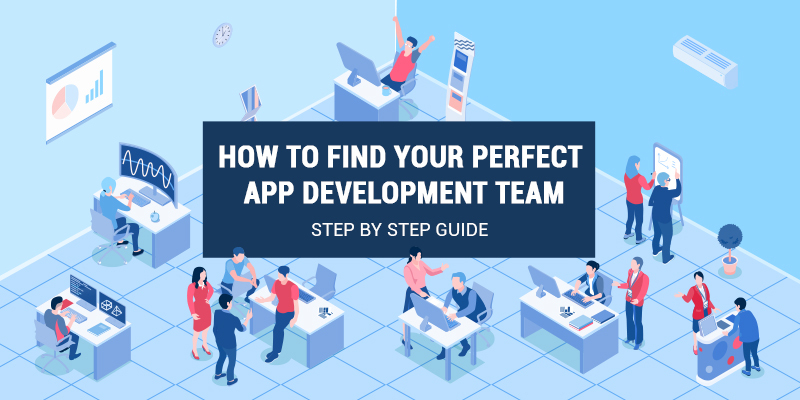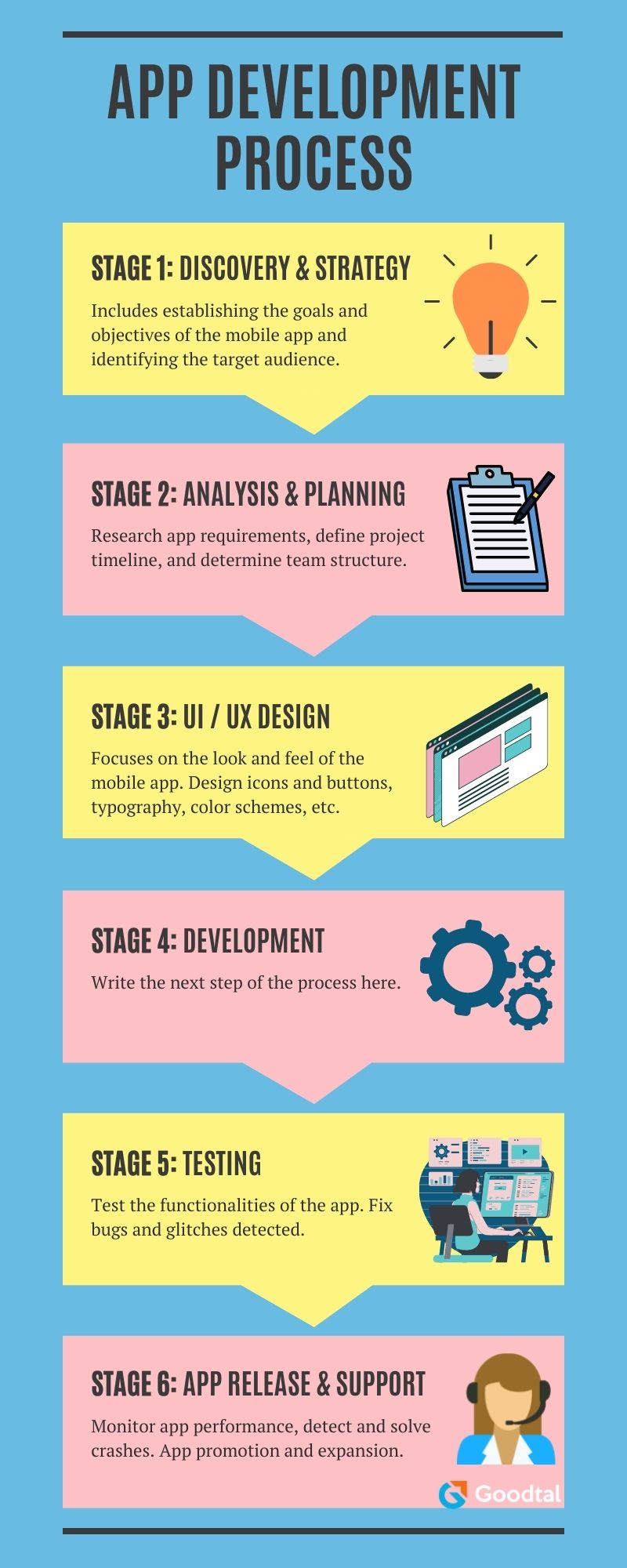
In this digital age, it is crucial for businesses to create and maintain an online presence. Although having a well-planned website has a significantly positive impact on clients, developing dedicated mobile apps accomplish the result at a higher level. Research by Statista reveals that mobile devices generated 54.8 percent of global website traffic in the first quarter of 2021. Customers evidently favor mobile apps due to their several benefits, such as faster and easier access, personalized experience, instant updates, notifications, etc. Mobile apps can use the device’s native features, allowing customers to have more intuitive and faster user experiences.
However, the biggest challenge while developing a mobile app is finding the right mobile app development team from a million mobile app development companies across the globe. This guide is your handbook for finding leading app developers who will match your business needs.
Before plowing headlong into the quest to develop a mobile app, let us first learn about the people you’ll be dealing with to create an optimized mobile app.
Step 1: Identifying Mobile App Development Team Skills
Based on the size and complexity of the app, businesses may need additional developers or designers for the app. A primary app development team should include the following experts
1. Project Manager
When you approach a mobile app development company with your ideas, you'll be designated a project manager as your guide and primary point of contact. A project manager's fundamental responsibility is to outline a plan of action and ensure that the project is within the agreed budget, time, and quality from start to finish.
They determine the problems that the mobile application plans to tackle and validate the product and assess the market and target audience to better design the solution.
The project manager's responsibilities include:
- Assigning tasks to the development team, determining terms for sprints, and prioritizing duties.
- Estimating the time frame for the project and staying within the budget.
- Maintaining communication between the client and developers.
- Acclimating changes to the app development plan.
- Handling risks and issues.
- Ensuring quality control.
In short, the project manager must be a jack of all trades who supervises every app development stage.
2. Backend Developer
- Building app frameworks and architecture.
- Building and sustaining reliable, reusable, and high-functioning code.
- Storing, securing, and presenting data to the right user.
- Providing mobile apps with the best quality, performance, and responsiveness.
- Using (APIs) across devices.
- Correcting app drawbacks and fixing bugs as reported by QA.
More or less, the backend developers are liable for the technical part of mobile app development.
3. UI/UX Designer
The design of an app plays a crucial role in ensuring the return of the user. The main task of the UI/UX designer is to create a visually appealing, intuitive, and engaging mobile app in order to deliver an exceptional user experience.
From deciding on an aesthetic color scheme to building a smooth navigation panel, web designers tackle every aspect of the mobile app front.
The responsibility of the UI/UX designer focuses on:
- Creating a user persona.
- Designing an effective user flow.
- Sketching app wireframes.
- Generating all visual and audio elements, including logos, graphics, animations, etc.
- Building an intuitive app interface.
- Making changes according to users’ feedback and testing results.
The UI/UX designer needs to have creative thinking and a flair for aesthetics as they oversee the overall look and feel of your app.
4. QA Engineer
The need to have a quality assurance or QA engineer is to ensure that the app functions exactly like it is supposed to - that there are no errors, bugs, or obstacles. In agile development methodology, the QA engineer tests the codes of the app after each iteration. Any bugs or potential glitches are detected, reported, and fixed at the earliest stage to guarantee that the development remains on track and is completed within the deadline.
The key responsibilities of a QA engineer involve:
- Performing automated and manual tests at regular periods.
- Tracking bugs throughout the testing cycle.
- Documenting test progress and reporting test cases.
- Identifying any potential threats.
- Develop testing protocols
- Define strict testing standards
Quality assurance is not optional when creating a well-designed product. Thus hire someone who displays a keen attention to detail and dedication to quality.
Step 2: Understanding the App Development Process
To get the best out of your mobile app idea, it is vital to understand the application development process. There are six stages of mobile app development.

Stage 1: Discovery/Strategy
This phase determines the sustainability of the project. The decision-makers need to work out everything about the app, from establishing the goals to methods of monetizing the app.
Moreover, determine the problems that the app aims to solve and outlines the benefits expected from the app. Finally, you should also scrutinize the target market while establishing behavior patterns and goals of your user’s persona.
Stage 2: Analysis and Planning
In this phase, you need to perform a thorough market analysis. A comprehensive study of your competitor’s product will help you identify the features and functionalities missing in their app so that you can include them in your app to stand out in the market.
You must also decide upon the selected mobile platform and app development technologies, such as language, framework, tools, etc. based on industry requirements and target audience. This stage is also used to outline the project timeline and team structure.
Stage 3: UI / UX Design
UX (User Experience) determines how an app works, while UI (User Interface) focuses on its appearance. This phase covers the designing part of the app. You need to create a user journey map in order to conceptualize the app better, including every button, text field, navigation menu, pop-up, etc.
In addition to establishing the technical aspects such as wireframe, structure, hierarchy, and correlation between the elements, this stage also decides the app's color palette, font, typography, etc.
Stage 4: Development
This is where the lion's share of work happens. The coding of the app commences based on the wireframe and architecture considerations. Using Agile methodology, the app development process is divided into multiple sprints. At the end of each sprint, a prototype is released, which undergoes thorough review and testing.
This is where the performance and security of the app are assessed, estimating the effectiveness of the final product. Moreover, top app developers set up hosting servers, databases, payment gateways, and other third-party API integrations for the app.
Stage 5: Testing
Before deploying the app, the app goes through zealous testing criteria to ensure the delivery of a glitch-free mobile application. Although with agile methodology, the codes are tested post every sprint to ensure no major bugs are left to solve.
It is advisable for companies to release a beta version for users to test the app's functionalities. Some of the most common testing types are QC testing, Unit testing, User Acceptance Testing, etc.
Stage 6: App Release and Ongoing Support
Once your product is ready, it is time to publish it on relevant app stores, whether Google's Play Store, Apple Store, or other such platforms. App developers ensure the proper operation of the app by implementing app monitoring tools, such as Google Analytics, Crashlytics, Firebase, etc. These tools help the development team detect crashes, follow the app's statistics, and plan product enhancements accordingly.
Certain mobile app development companies also offer app marketing solutions to boost app downloads either by promotional activities via third-party apps or by implementing direct marketing and advertising tactics. The post-development phase also includes further expansion of your product and adapting to changing market conditions.
Step 3: Deciding Between In-House Team v/s Outsourcing
Most businesses with plans to launch their mobile app are plagued by whether to develop an app in-house versus outsourcing it. As both in-house and outsourcing business models have their own pros and cons, evaluating them before creating your app is crucial.
Let's discuss both approaches and understand which is more convenient and fits your business requirements.
What Is In-House Mobile App Development?
In-house app development is where a company selects a hand-picked team of project managers, DevOps developers, Cloud developers, Blockchain developers, E-commerce developers, designers, Software Testing, etc. The entire app development project is regulated in-house in this process. This requires the company to provide office space, proper infrastructure, etc., for the team to work conveniently.
Advantages
Seamless communication is the most prominent benefit of building an in-house team that speaks your local language and shares the same space. This results in fewer barriers and constraints, fewer misunderstandings, and better face-to-face discussions.
Furthermore, you can monitor the daily progress made by mobile app developers during the entire app development process.
Disadvantages
Establishing an in-house development unit can be a challenge as you have access to a limited pool of talent. The best developers and designers within your area will be highly in demand, making it difficult for you to hire them.
You need to offer them the best salary scale in the market in addition to perks such as insurance, allowances, paid vacation, etc., to retain the staff and keep them motivated for your project.
You also need to invest in infrastructure and technologies, such as office space, work devices, servers, etc., for your in-house team to operate successfully.
What Is Outsourcing Mobile App Development?
Outsourcing mobile app development refers to hiring an already established team of experts for the development project. A good proportion of industries across the globe opt to outsource their business requirements. It is expected that the revenue in mobile application outsourcing will reach US$109,478.4 million by the last quarter of 2021.
Advantages
The most significant benefit of outsourcing your app development services is that businesses save a lot of time and money. Instead of hiring every member of the app development team individually, companies can conduct interviews to zero down on one company, saving time and effort.
As for the monetary aspect, you do not need to invest in infrastructure and technologies as the outsourcing partner is liable for providing you with the best available resources. Moreover, you can hire from one of the developing nations with highly skilled laborers at a rate far below local standards.
The best mobile app development companies offer you the benefit of versatility due to their years of expertise and experience in working on different types of app development projects.
Disadvantages
However, there are a few disadvantages of mobile app development outsourcing. The difference in the time zone and language compatibility between the client company and the service provider can cause miscommunications. Communicating business requirements and time availability in advance can efficiently resolve this issue.
Another problem with outsourcing your business services is security concerns, such as data breaches, claiming ownership of intellectual property, etc. Signing a Non-Disclosure Agreement (NDA) along with stricter data protection policies can be the best route to tackle security threats.
All things considered, the benefits of outsourcing mobile app development far outweigh its risks as well as the benefits offered by in-house business models.
The next question that arises is how to find the best app development partner for your project.
Step 4: Hiring an App Development Company
It is essential to thoroughly evaluate every mobile application development company to find the best one. Below are a few specifications you must consider when hiring mobile app designers for your dream app project.
Examine the Apps Developer’s Portfolio
An app development company's portfolio gives you insight into its operating principle and the various projects managed. It also highlights their strengths and weaknesses, allowing you to analyze their capabilities.
Portfolio also offers you the chance to look at past work experience to understand how well they performed on other projects, specifically catering to your industry. You must also talk with the team as they will be the ones handling your project at the core level.
Check Testimonials
Client testimonials help you find out the variety of work app developers have done as well as the brands they have worked with in the past. Authentic reviews will help you sort the best from the good and build your confidence in deciding on the right mobile app development company.
The reviews and references help you understand their expertise and niche. However, to avoid getting lured by fake reviews, it is crucial to check out independent listing firms, such as Goodtal, that offer authentic and verified character references.
Discover Their Development Approach
Before finalizing the deal, the client and the service provider must be in agreement with the development approaches. You must assess whether the outsourcing partner offers the app development methodology that you prefer.
Moreover, evaluate whether they hold expertise in the language and framework required for your project. The answers to these issues will narrow down the search for the best candidate. However, it is advisable to be open to suggestions as they are better aware of the dynamic market and industry trends.
Confirm the Services Included
Mobile app development is a vast sector that intertwines with different services. Thus, it is critical to evaluate whether you are receiving your money's worth or not. Ask prospects to provide you with the list of services included in their package.
The following are some of the essential services included in the app development process:
- App Designing: Most app development companies offer fundamental designing services. However, if they don't or you have extensive design needs, ask for references from external app designing firms.
- Testing: Testing evaluates the app's performance and validates the app's behavior across various devices. The overall cost of the project must include basic testing facilities. However, certain app development agencies provide comprehensive app testing services at an added cost.
- Post Launch Assistance: After app deployment, you need a professional to ensure the successful operation of the app. You can either include it in the contract for an annual subscription charge. Or altogether hire a third party specializing in app maintenance.
- App Marketing: App marketing is essential to ensure the success of your app. Inquire whether the app development partner offers pre-launch and post-launch marketing services.
Get Quotations
The all-inclusive cost of creating a mobile application depends on the features incorporated in the app, the time required to finish the project, its scalability range, and the overall complexity. Your project is time-sensitive and thus you must opt for a partner that offers great rates for a shorter turnaround time. However, make sure that the quality of work does not suffer due to budget restrictions.
Opt for experienced app developers who can offer rapid deployment of an app without requiring multiple revisions within your budget. Ask for quotations from the shortlisted agencies and ask them to include a comprehensive and inclusive rate for any additional service offered.
To Sum It Up!
Mobile apps are a crucial support for the prosperity of your business. The best app developers can evaluate the market, predict the challenges, and create a failsafe plan to deploy your app. If you wish to build custom mobile applications for a specific operating system, opt for the top iOS App developers or the top Android App developers to take your business up a notch.
Goodtal understands that you’ll be operating on a fixed budget, and getting it right the first time is crucial. Hence, find an app developer that best fits your requirements using the above guidelines.
